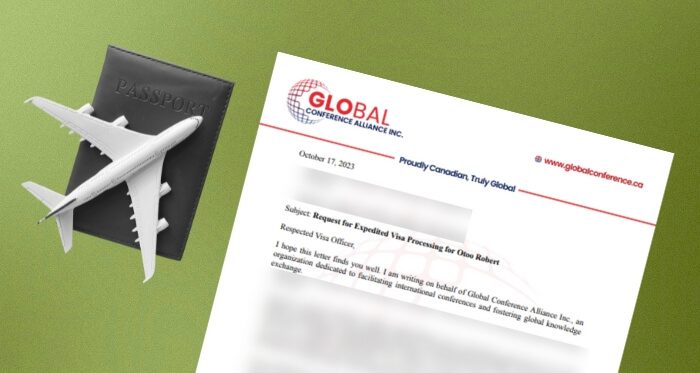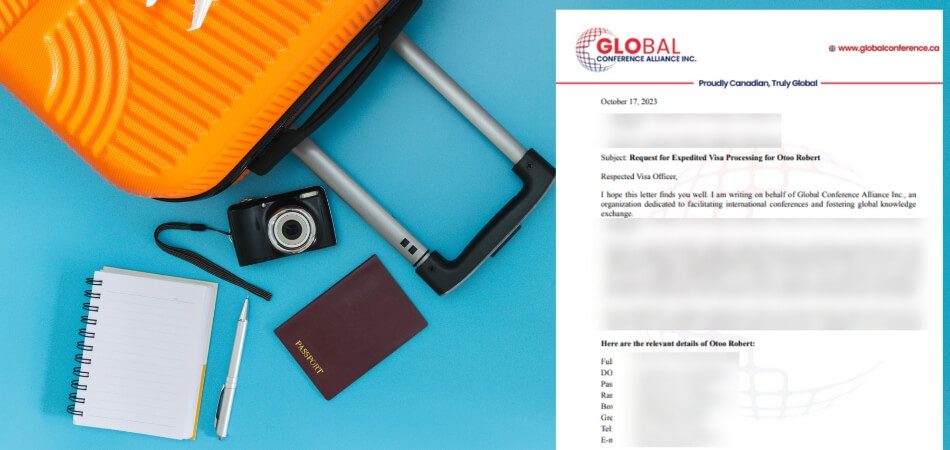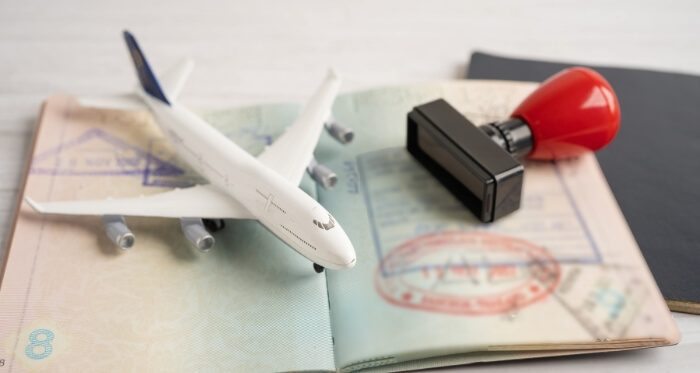Are you arranging a journey that will include a stopover or transfer to another nation? To ensure a smooth vacation, it’s essential to be well-organized and knowledgeable about the criteria. A common question travelers often find themselves asking is: Do I need a Visa Support Letter for a Transit Visa?
Yes, some countries categorically require a visa support letter for a transit visa as it verifies your intended route of travel. This important detail may play a key role in ensuring that your journey goes well and without additional obstacles.
In this blog, we’ll take a closer look at visa support letters: when they become necessary, how to obtain one, and the importance of checking the specific prerequisites of the country you’re transiting through. If you’re planning a journey that involves transit visas, read on for valuable insights.
The Basic Concept of Visa Support Letter
A Visa Support Letter serves as a formal document in the visa application process. Often required by embassies or consulates, it validates the applicant’s reason for traveling and ensures that the traveler’s intentions align with the visa type. This letter provides vital details like the travel purpose, duration, accommodation specifics, and sometimes financial assurance.

While primarily associated with tourist, business, or student visas, it’s also prevalent for transit purposes. The content varies, but it generally includes the host’s details, the inviting party’s information, and in some cases, the itinerary. An accurate and comprehensive letter can significantly ease the visa acquisition process and give the applicant a higher chance of approval.
Different countries have their distinct criteria and expectations for these support letters. To ensure smooth visa processing, travelers are advised to research the specific requirements of their destination country. Having a well-prepared Visa Support Letter not only facilitates the visa process but also provides peace of mind during international travel.
Do I Need a Visa Support Letter for a Transit Visa?
Understanding complex visa regulations is necessary for managing overseas travel. Among these, one can wonder, do I need a Visa Support Letter for a Transit Visa? Knowing this idea can make your transit experience more efficient.
Transit visas typically permit travelers to pass through a country en route to their final destination. In some instances, countries demand a visa support letter, clarifying the traveler’s brief stay. This document affirms the traveler’s intentions and ensures compliance with local regulations.
The necessity for a visa support letter varies among nations and their individual visa protocols. Some countries emphasize its importance, viewing it as evidence of genuine transit intentions. Consequently, acquiring one ahead of travel can significantly reduce potential complications at immigration.
Though the process might seem tedious, it’s necessary for a smooth travel experience. Engaging in thorough research about your transit country’s requirements is imperative. Being well-prepared can prevent undesirable delays and ensure uninterrupted journeys.
Types of Visas that Typically Do Not Require a Visa Support Letter
When it comes to visas for travel, not all of them need a support letter. Some visas are easier to obtain without this extra paperwork. In this guide, we’ll explore the types of visas that usually don’t require a support letter.
Visa on Arrival (VoA)
Visa on Arrival is typically granted at the traveler’s point of entry. This category often sidesteps the need for pre-travel documentation like support letters. Instead, it emphasizes instant approval based on preset criteria.
Electronic Visas (e-Visas)
E-Visas are digital visas obtained online before travel. The application process is streamlined, frequently bypassing the need for traditional support letters. Verification is done electronically, focusing on quick processing and approval.
Schengen Visas
The Schengen Area promotes free movement among its member states. While some Schengen visa categories might require support letters, many don’t necessitate this additional documentation, simplifying the application process.
Bilateral Agreement Visas
Some countries maintain bilateral agreements that allow visa-free or simplified visa procedures for citizens of partner nations. These agreements tend to eliminate the need for support letters. Such relationships prioritize diplomatic ties and mutual trust.
Waiver Programs
Certain countries have mutual agreements for visa-free travel with specific nations. Such waiver programs promote tourism and business exchanges. With the visa requirement waived, there’s no need for a supporting letter.
Short-Term Tourist Visas

By discerning which visa categories require minimal documentation, travelers can approach their journeys with greater confidence and fewer hurdles.
How to Obtain a Visa Support Letter?
The application process for visas can occasionally feel like sifting through an ocean of rules and paperwork. The Visa Support Letter, a formal declaration of your intent and arrangements in the host country, is one of the essential documents that tourists may want. The process is made easier by our guide’s step-by-step instructions for acquiring this important document.
Step 1. Understand the Requirement
Before starting any visa application journey, it’s vital to understand the specific needs of your destination country. Different countries and their respective visa categories may have unique requirements. Researching in advance ensures you don’t overlook critical components like the Visa Support Letter.
Step 2. Identify the Issuing Authority
Each visa type may have a different entity responsible for issuing the Visa Support Letter. This could range from an individual hosting you, an employer, an educational institution, or even a conference organizer. Recognizing the right authority streamlines the process and ensures authenticity.
Step 3. Compile Necessary Information
A Visa Support Letter should be detailed and precise. You’ll need to gather relevant details, such as your travel dates, accommodation arrangements, personal identification details, and the clear purpose of your visit. Accurate information minimizes the chances of discrepancies or rejections.
Step 4. Draft the Letter
While some organizations or individuals might have templates, in other cases, you’ll need to draft the letter yourself. Ensure the tone is formal and all the gathered information is presented clearly. A well-structured letter can make a difference in your application’s outcome.
Step 5. Obtain the Official Stamp or Signature
To reinforce the credibility of your Visa Support Letter, it should bear the signature and, if applicable, the official stamp of the issuing authority. This step is vital; it confirms the document’s authenticity and legitimacy in the eyes of the reviewing officials.
Step 6. Cross-check Details
An oversight, no matter how minor, can complicate your visa application. Double-check your Visa Support Letter against the information in your visa application. This meticulous review ensures consistency and accuracy across all documents.
Step 7. Make Multiple Copies
After finalizing the letter, it’s prudent to have several copies on hand. This not only aids in keeping a personal record but also prepares you for any eventualities, such as misplaced documents or additional verification requests.
Following this enhanced guide will arm travelers with a well-prepared Visa Support Letter, increasing the likelihood of a smooth visa application process and a memorable trip.
Tips and Advice for a Successful Transit Visa Application
Acquiring a transit visa is crucial for smooth international journeys through countries with visa requirements. A successful application relies on preparation and accuracy. Here are some vital tips and advice to enhance your chances.
- Research Thoroughly: Different countries have unique transit visa rules. Ensure you’re well-acquainted with the specific requirements of your transit nation.
- Apply Early: Visa processing can take time. To avoid last-minute stress, start your transit visa application well in advance.
- Provide Correct Details: Ensure personal information matches your passport. Inconsistencies can lead to delays or outright rejections.
- Document Clarity: Submit clear, legible copies of necessary documents. Blurred or unreadable documents might hamper your application.
- Proof of Onward Journey: Always provide evidence of your next destination. This proves your transit status and genuine intent.
- Stay Updated: After application, monitor your visa status. Address any additional queries or requirements promptly.
- Financial Proof: Some countries demand proof of funds. Ensure you have evidence of financial stability for your journey.
- No Overstays: If previously visited, show evidence of adhering to visa durations. Overstays can negatively impact future applications.
- Health Precautions: Some nations require health checks or vaccinations. Being compliant is vital to avoid visa denials.
- Seek Expertise: If unsure, consider professional visa assistance. Their expertise can guide you through complex visa processes.
By adhering to these tips, travelers can bolster their transit visa applications, ensuring fewer hurdles during their international adventures.
Conclusion
International travel means dealing with different rules, especially about visas. A common question is, do I need a Visa Support Letter for a Transit Visa? While visas like the Visa on Arrival or e-Visas often don’t require this extra document, for some countries, having this letter is essential. This letter is like a promise that you’re just passing through and not planning to stay.
Countries that ask for this support letter want to ensure order and clarity. They aim to understand travelers’ intentions and ensure everyone sticks to the guidelines. It helps in making transit smoother and more manageable for both travelers and the host country.
If you love traveling, being aware of these small but essential details can make a big difference. Preparing in advance and understanding these requirements can pave the way for a hassle-free journey. After all, being informed is the best way to enjoy a trip without any hiccups.






